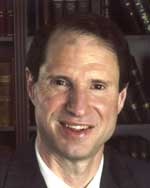 As Congress debates healthcare reform, Oregon Sen. Ron Wyden has emerged as a leading advocate. Sen. Wyden has proposed an amendment to the bill currently under debate – America's Healthy Future Act of 2009 – which would allow people who are dissatisfied with their current insurance to choose an alternative public plan.
As Congress debates healthcare reform, Oregon Sen. Ron Wyden has emerged as a leading advocate. Sen. Wyden has proposed an amendment to the bill currently under debate – America's Healthy Future Act of 2009 – which would allow people who are dissatisfied with their current insurance to choose an alternative public plan.
As it stands, the bill says anyone who already has insurance through an employer must keep it. But Wyden's free Choice Amendment would allow those who don't like their current plans – for example people with unaffordable premiums or high deductibles – to switch plans.
"Here is our chance to link choice, real choice, with the public option and tell people: 'If you're being hammered today, if you're stuck with a product you don't like, we're going to liberate you; we're going to put you in charge'," Wyden told MSNBC's Rachel Maddow, Tuesday.
Wyden points out that, while the current bill requires states to offer health plans through an insurance exchange, only about 12 million Americans would be eligible to apply for these public plans. The result would be that only the sickest, poorest people would receive coverage through this public option, he argues, undercutting states ability to negotiate strong deals. Strength lies in  numbers, Wyden says, and giving consumers choice would strengthen states' negotiating power.
numbers, Wyden says, and giving consumers choice would strengthen states' negotiating power.
"It will send a message on day one to the insurance lobby that if you abuse somebody, if you abuse one of your consumers—rip them off, give them lousy treatment, jack up the rates, they are going to turn the tables on you and they are going to choose another product."
Wyden has offered three amendments: the Free Choice amendment that would allow employees to switch plans, an amendment that would extend subsidies to more lower income people, and an amendment that would require states to offer plans that are comparable with those enjoyed by members of Congress.
"I think it is so important for people to understand this is about taking on the insurance lobby with choice rather than tethering somebody to something they don't want and they don't like." Wyden said of his free choice amendment.
Republicans Oppose the Bill
Republicans have opposed any public option plans because they argue that the government should not get involved with offering health care, that it will cost too much, and that a public option would drive insurance companies out of business.
"You should anticipate overwhelming Republican opposition to government-run health insurance," Rep. Mike Pence ,R-Ind., told the Washington Independent. "Will it be unanimous? I refer you to the whip's office."
And Sen. Mike Enzi, R-Wyo., one of the Republican "gang of six" considered the most likely Republicans to vote for some kind of health reform, said he would not support the current bill. "The proposal released today still spends too much, and it does too little to cut health care costs for those with health insurance," he said publicly Sept. 16. "At a time when our nation faces an estimated $9 trillion deficit in the coming decade, we should target assistance to those in the greatest need without creating unsustainable new entitlement programs."
The Finance Committee has estimated the cost of the bill at $856 billion over 10 years, but the Congressional Budget Office, which is the official federal office for budget forecasting, estimated that the bill in its current form will cost $774 billion, but would ultimately reduce the federal deficit by $49 billion between 2010 to 2019 because of provisions such as: a 35 percent tax on high-cost health insurance plans, and spending reductions. However, 564 amendments to the bill have been tabled, and each of these could alter the financial impact of the bill.
Democrats Increase Pressure for Public Option
Since the president's speech on the issue, several Democrats have renewed the pressure for a public option. The current bill stops short of the Medicare-like program, favored by many public option advocates. Instead it would create health co-ops, which would offer plans through state health insurance exchanges.
New York Sen. Charles Schumer this week called on fellow Democrats to push for a public option, saying, "I'm a firm believer in the public option because I think it is vital to create greater competition."
And Sen. Jay Rockefeller of West Virginia, has proposed an amendment that would create a government-run public option.
"I believe we need to provide families with the option of enrolling in a public health insurance plan," Rockefeller told the finance committee. "A health insurance co-op is not a workable solution or a replacement for the public option."
A handful of Democrats are opposing the current bill, on similar grounds to Republican opponents. One of the most prominent, Rep. Mike Ross of Arkansas, was investigated by the journalism nonprofit ProPublica. The investigation found Ross had received more than $1 million from a property and business deal with a pharmacy chain. Ross says the deal was fair and nothing to do with his vote on health reform.
The Next Step?
If Democratic leaders cannot reach a compromise that secures the support of at least a handful of Republicans, and the Democratic holdouts, they could resort to a process called reconciliation that requires only 51 votes to pass. That process was used under President George W. Bush to pass tax cut bills opposed by the Democrats. So far, Nevada's Sen. Harry Reid, D—Nev., the Democratic Majority leader, has been unwilling to take this route, unpopular because it overrides the requirement for 60 votes to close the debate and move to a final vote. In the past reconciliation was used only to pass budgets or in emergencies. Sen. Reid has said he will use reconciliation as a 'last resort.'
Sen. Wyden warned fellow Democrats that between 70 to 80 percent of the public want to see a solution to rising health care costs and the problem of 40 million uninsured.
"You bet, if Congress passes somehow an anti-consumer, anti-choice, anti-holding insurance companies accountable bill, I think we'll pay dearly for it."










